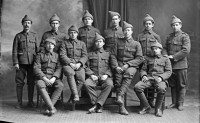
With Remembrance Day upon us I'd like to take some time away from the political arena and instead take this opportunity to remember an important part of the military history of Newfoundland and Labrador.
Each year at this time we are all asked to take a few moments from our daily schedules to remember those who have fought and died in the name of their various Countries in war after bloody war.
While the Dominion of Newfoundland may no longer exist, the men who fought and died to protect it are no less real and remembering their sacrifices this Remembrance Day is the least we can do.
Many Newfoundlanders and Labradorians, at least those over the age of 30, likely remember the Australian war ballad “The Band Played Waltzing Matilda”, made famous in this province, by Liam Clancy.
The song contains the heart wrenching lines:
…the band played Waltzing Matilda,
As our ship sailed away from the Quay
And amidst all the cheers,
Flag waving and tears
We sailed off for Gallipoli
Well I remember that terrible day
When our blood stained the sand and the water
And how in that hell that they called Suvla Bay
We were butchered like lambs at the slaughter.
Johnny Turk he was ready
Oh he primed himself well.
He rained us with bullets,
And he showered us with shells.
And in five minutes flat,
We were all blown to hell
Nearly blew us right back to Australia…
The reason I bring this up is that while most of us have grown up hearing stories about the near annihilation of the Newfoundland Regiment at Beaumont Hamel, there have been other battles in our history that are less known though no less bloody.
Many of us may also be familiar with the words of the now famous Australian song but few of us are aware of the Regiment’s connection to the song’s subject and the blood stained soil of Gallipoli.
In early 1915, a year before the famous battle at of the Somme, the Newfoundland Regiment was sent to Egypt on its way to its very first commitment in the theatre of war, Gallipoli. This would be the place where the Regiment came close to being wiped out for the first time.
The Newfoundland Regiment landed at Suvla Bay on the Gallipoli peninsula on the night of September 19th 1915 in order to reinforce the hard-pressed British 88th Brigade of the 29th Division.
From the beginning the Regiment had a hard time; day and night the Turkish army, in control of the high ground surrounding the beach, poured a constant stream of artillery and sniper fire down upon the line. Casualties mounted day by day and the constant enemy fire made re-supply difficult. Food and water shortages were common.
In spite of the hardships the Regiment played an important part in advancing the line and was awarded two Distinguished Conduct Medals and a Military Cross during the fighting.
With the coming of winter conditions went from bad to worse.
On November 26th a severe storm struck the Regiment a nasty blow. Three days of torrential rain and driving sleet washed away trenches and supplies and as the temperature fell rapidly the rain turned to snow.
With food and water running short and little or no shelter even the hardy men of the Newfoundland Regiment, who were no strangers to bad weather, began to succumb and several died of exposure.
By December 10th the Regiment was down to a quarter of its original strength.
Toward the end of the Gallipoli Campaign the “Newfoundlanders”, as they were called, were given the job of holding the Turkish forces. They formed part of a defensive line and the fighting was "hellish" for a number of weeks.
Eventually, on December 20th, the British decided to withdraw from Suvla and the Newfoundland Regiment was sent to Cape Helles to assist in the final exodus of British forces.
By then only 170 men were left.
The “Newfoundlanders” were among the very last troops to depart.
After the bloody and deadly Gallipoli engagement the Regiment began the task of rebuilding the tattered remnants of the unit in preparation for there next major engagement, at the Somme, and the now famous battle of Beaumont Hamel.
Perhaps we should take a moment this Remembrance Day to look back with pride on the fact that in North America it is the Newfoundland Regiment alone that has the distinction of having fought at Gallipoli.
No military units, from what was Canada back then, made it to the Dardanelles.
Ever since Newfoundland and Labrador became a part of Canada in 1949, what those brave troops did has been considered a part of the history of all of Canada, and as such all Canadians, not only Newfoundlanders and Labradorians, should take the time to remember and be thankful.
 With Remembrance Day upon us I'd like to take some time away from the political arena and instead take this opportunity to remember an important part of the military history of Newfoundland and Labrador.
Each year at this time we are all asked to take a few moments from our daily schedules to remember those who have fought and died in the name of their various Countries in war after bloody war.
With Remembrance Day upon us I'd like to take some time away from the political arena and instead take this opportunity to remember an important part of the military history of Newfoundland and Labrador.
Each year at this time we are all asked to take a few moments from our daily schedules to remember those who have fought and died in the name of their various Countries in war after bloody war.